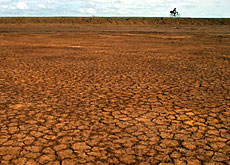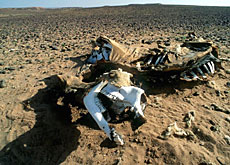Experts tackle the effects of desertification

Experts hope to come up with new ways of combating desertification at a conference organised by Switzerland and the United Nations.
The meeting, which started on Tuesday, will also focus on the plight of 25 million “environmental refugees” displaced by land degradation and food insecurity.
“The issue of desertification has largely been ignored by the international community. There is a lack of interest and a lack of support,” Liliane Ortega, Swiss representative to the UN Convention to Combat Desertification (UNCCD), told swissinfo.
“The problem is that many poor countries don’t have the means to fight desertification and the situation, because of human and climatic reasons, is getting worse and worse. It’s not an issue – unlike climate change or biodiversity – in which the economic world is very interested.”
The UN says almost a quarter of the earth’s surface and over a billion people are affected by desertification. In Africa alone 325 million people are said to be living “precariously” in arid zones.
Forced migration
The world body is using the International Year of Deserts and Desertification to focus on the causes of land degradation and above all its consequences – poverty, famine and forced migration.
Climate change is a clear factor, but population growth, deforestation, intensive agricultural and livestock farming are also to blame for exhausting the land. “All these factors are the cause of serious ecological breakdowns which have resulted in a degradation of areas where societies have lived for centuries,” said Ortega, who is a natural resources and environmental specialist at the Swiss Agency for Development and Cooperation (SDC).
The SDC, along with the UN, believes a two-pronged approach to tackling desertification is now needed. This should not only address the ecological devastation but also the human rights of those living in arid zones.
“I am convinced that the situation of the dry lands is more likely to deteriorate through lack of investment and action against food insecurity than because of global climate change,” said Ortega.
Environmental refugees
Jean Ziegler, UN special rapporteur on the right to food, agrees. He says not enough is being done to protect the estimated 250 million victims of ecological destruction worldwide and the millions of environmental refugees being forced off the land and into slums.
“These refugees have no protection under international law,” he said. “They are not covered by the 1951 refugee convention because they are not victims of racial, political or religious persecution.
“This conference is very, very important because it marks the joining together of two efforts – that of recognising the basic human rights of the victims of this terrible catastrophe and how to prevent the destruction of these ecosystems,” added the former Swiss parliamentarian.
Ziegler dismissed arguments that farmers themselves were to blame for the degradation of the land as “pure hypocrisy” on the part of the West, which he said had a moral duty to help repair ecosystems.
swissinfo, Adam Beaumont in Geneva
The Swiss Agency for Development and Cooperation and the secretariat of the UN Convention to Combat Desertification (UNCCD) are jointly hosting this week’s conference on “Desertification, hunger and poverty”.
The issue of desertification was given global recognition with the adoption of the UNCCD in 1994 but since then limited progress has been made. Switzerland was one of the first countries to ratify the convention in 1996.
The SDC is involved in anti-desertification programmes in Africa, Asia and Latin America, supporting projects in water conservation, reforestation, preservation of soil productivity and combating erosion.
According to the UN:
Almost 30 per cent of the world’s habitable space is threatened by desertification.
Degredation of the dry lands in Africa has destroyed 500 million hectares of farming and grazing land.
Every year ten million hectares are lost to agricultural production worldwide because of desertification.

In compliance with the JTI standards
More: SWI swissinfo.ch certified by the Journalism Trust Initiative

You can find an overview of ongoing debates with our journalists here . Please join us!
If you want to start a conversation about a topic raised in this article or want to report factual errors, email us at english@swissinfo.ch.